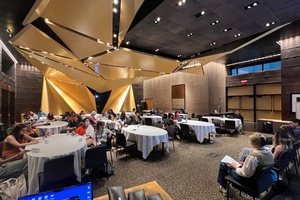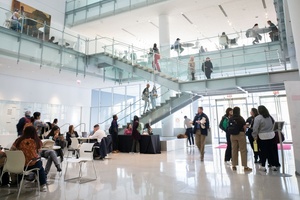Features:
Meet KeyBlur and America’s Slow Lane
More projects from the #owhack Hack Day

Members of the KeyBlur team deliberating
Earlier today, I posted a few details about works-in-progress emerging from last weekend’s MIT-Knight-Mozilla Hack Day. The event produced six great projects, and we have two more to share with you: KeyBlur and America’s Slow Lane.
KeyBlur: A Deaddrop Marauder’s Map for Crises on the Open Net
Team: Harlo Holmes, Aurelia Moser, Heyzen Zeynep, Marcos Vanetta, Mike Tigas, Friedrich Lindenburg.
Note from the team: The project repo is private until we clean up a few more things and get the installation process streamlined.
When you can’t trust the public internet for securing filesharing, you can build a private system for free speech and infosyncing. Knight-Mozilla Fellow Harlo Holmes pitched this project, which is a way for people to share files on a local network using SyncThing—and a platform for a multitude of collaborative apps. (Its name is inspired by the Keebler elves’ tree.)
We asked Harlo Holmes why she initiated the project, and she explained:
I’ve been doing research on how communities respond to internet blackouts across the globe. In the field of circumvention technology, we tend to build tools in response to sudden crises; the internet is shut down in response to a demonstration, the internet is unavailable due to an earthquake… These tools are amazing, and necessary in this world, and I’m proud to be part of a community that builds them, but circumvention tech creates other stuff, too! I wanted to spotlight lesser-known solutions in the circumvention tech space that are creative responses to the mundane and consistent barriers to internet access.
In the early 2000s, a group of technologists in South Africa created a system called Wizzy Digital Courier, which was pretty much an Email-on-Wheels program. A truck was outfitted with a special router that would drive from school to school in a town, delivering and sending its email at every stop by automatically syncing with the school’s router. The system is simple and complex at the same time; it optimizes itself by exchanging difficult technical problems for its analog solution. The internet didn’t work. Implementing an ISP from scratch is a very large technical feat; so they optimized by exchanging the wires for the roads, and packets for vehicles. I wanted to celebrate this type of creativity, and extend the idea even further.

Members of the KeyBlur team in overview
Project contibutor (and fellow Knight-Mozilla Fellow) Aurelia Moser joined the project out of an interest in “projects that provide information in crisis situations, when the internet and proprietary storage is not trustworthy or available”:
KeyBlur grew out of this desire to support secure filesharing on a small network, to enable location-specific information distribution and storage. The possibilities for building on top of the platform are pretty open, however, anything that requires a file-system or tree as a back-end could probs plug in.
The team also whipped up FlatChat, a decentralized, offline, flat-file based chat program that can share messages via KeyBlur (public repo here).

FlatChat running locally
I asked Holmes what it would take to get KeyBlur production-ready:
It was surprisingly simple to get a lot of the basic pieces up and running, so I find it kind of funny to say “production ready” because it’s not really a product. I’d rather say that we’re a project modeled after PirateBox or LibraryBox; something you can build yourself, or just use this bunch of scripts we made if you can’t figure it out. (Hmmm, maybe that’s the definition of a product, in open source!)
The code repository is pretty barren: it mostly represents the scaffolding of the “product” and includes bits of code that we’re certain works well enough. If we were working at the same hackathon pace, two weeks of work would bring us to production-ready. Then we would want to perform an audit, and tack on enough time to respond to that.

Inspiration
Holmes and Moser plan to continue working on the project and to demo it at HOPE X. Beyond that, they’re planning more apps to run on top of it, along with mobile clients—the latter in collaboration with former Fellow Mike Tigas.
The main project repo is currently private while the team continues to build out capabilities. Look for a Source update once they open the project up for wider collaboration.
America’s Slow Lane: Faux-Astroturfing Against Net Neutrality

From the America’s Slow Lane site
Team: Kawandeep Virdee, Latoya Paterson, Rebekah Monson, Chris Barr, Lyre Calliope, Chris Sopher
Website: America’s Slow Lane
Hackpad: Slow Internet Movement notes
Repo: https://github.com/rebekahmonson/slowlane
Kawandeep Virdee pitched this project, a fake anti-net-neutrality astroturf group and “mischievous art project.” He describes its rationale and the possible future world from which it springs:
What would the loss of net neutrality concretely mean and feel like? The campaign is coming from a reality in which ISPs gained even more control and started throttling websites—breaking them and causing a slower internet. ISPs were astroturfing with America’s Slow Lane to raise appreciation for a slower web, which is pretty absurd. You can experience these “benefits” with the Chrome extension, but when you use it, you really find yourself in an awful, annoying browsing experience. Who wants that reality? This project hacks ISP brands to strengthen the cause for the open web.
Project contributor Latoya Peterson explained that because Net Neutrality is a such a complicated thing to promote, they decided on agitprop via browser extension: “by flipping the idea and presenting a vision of a world where ISPs help you manage your internet expectations, we hope that people will have a more concrete vision of what is at stake.”

The team’s “Science Fair” poster for the even-of-event presentations
So why a fake advoacy site instead of something more technically intensive? Rebekah Monson joined the project precisely because of its policy focus:
Often at hackathons, we focus specifically on technology problems, but there are a number of issues around the open web that require policy solutions. As webmakers, I think we need to recognize that policy and advocacy are as important to our work as technology itself. We wanted to build something fun that would give everyone a creative outlet and work on advocacy for the open web. So, we went with satire … well, because internet. As a group of folks with community organizing, art and storytelling backgrounds, this sort of work was well-suited to our skills and interests, and we had a great time working together.
Peterson called out Adbusters and old-school culture jamming as an influence on her work on the project, and called the final version a “24-hour, ephemeral internet sprite” meant to spark conversations—and, ideally, imitators. “I hope other activists will make their own versions of this,” she wrote, “so we have a really robust conversation about net neutrality—we can do more than explain the issue.”
Up Next: The Final Two
Stay tuned: our last two projects from the Hack Day, along with our notes as organizers, will be up tomorrow.



